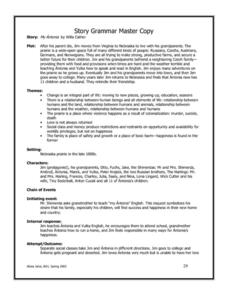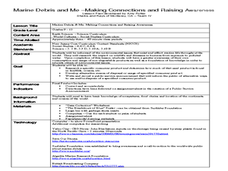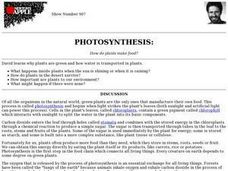Curated OER
Secrets of the Ocean Realm - Survival in the Sea
Students determine the sequential links in a marine food chain and identify the roles that various organisms play in this chain. Students develop charts as visual aids for illustrating marine food chains.
Curated OER
Lower the Trans and Increase the Omega-3s
Students identify the health risks associated with trans fats. In this adult health lesson, students examine food labels for hydrogenated oils content. They discuss the benefits and sources of omega-3s.
Curated OER
My Antonia: Story Grammar
Pupils can write down all of the major plot elements of My Antonia by Willa Cather on this straightforward worksheet. Learners note down themes, characters, the chain of events, and more.
Curated OER
Marine Debris and Me
Students study the environmental issues that pertain to the marine environment. In this research ocean landfills lesson students come up with alternative means of disposal.
Curated OER
"From farm to plate"
Students identify sources of food and the bacteria associated with them. They comprehend how bacteria in the food chain can cause disease. Students comprehend the importance of proper food-hygiene practices throughout the many stages of...
Curated OER
From Farm to Table
It's important for students to understand where our food comes from and the environmental implications of agriculture.
Curated OER
How Far Did It Travel?
Sixth graders read and discuss background and vocabulary. They use the background to develop a flow chart showing the movement of food from farm to table and work independently or in groups to complete an activity. They then use Internet...
Curated OER
Photosynthesis: How do plants make food?
Students study why plants are green and how water is transported in them. They examine how plants respond to different amounts of light.
Curated OER
March Market
Students role play a living wetland food web. They trace the food web associated with the items in their lunch.
Curated OER
Amphipod Ecology
Learners count amphipods under kelp wracks of varying ages to explain how long it takes for them to find their food source. They collect and represent the data.
Curated OER
Track the Path of Coffee From Farm to Store Shelf
Students investigate the cultivation and marketing of coffee. In this global studies lesson, students consider the connections of the 21st century world as they explore how coffee makes it from farms to their homes. Students consider the...
Curated OER
Science Videos
Students plan, practice, and act in a 2-3 minute videotaped production about a specific topic. Students from a local high school give presentations pertaining to seasons, earth rotation, and moon phases. Students analyze the...
Curated OER
The Red Kangaroo: An Outback Survivor
Students watch an episode of "Nature" about the "Big Red Roos." They create food chains and webs based on the information they've researched on the red kangaroos. They write an editorial on the topic of the killing of kangaroos in the...
Curated OER
Rain Forest Adventures
Students discover locations of the world's rain forests. Once they identify the animals, plants, products, and resources located in them, they construct they own rain forest terrariums. By comparing and contrasting the two types of...
Curated OER
Plastics by the Numbers
Students investigate plastic resins and their uses. In this plastics lesson plan, students describe major plastic resins and what they are used for, they compare and contrast the properties of plastic resins and they list products that...
Teach Engineering
The Great Pacific Garbage Patch
The Great Pacific Garbage Patch is one of several garbage patches around the world where garbage accumulates naturally. As part of a GIS unit that combines oceanography, environmental science, and life science, class members investigate...
Curated OER
Rainforest Vocabulary Words: Week 1
In these rainforest vocabulary worksheets, read the definitions and the matching terms for the following rainforest vocabulary terms: decomposers, deforestation, epiphytes, extinct, environment, pollute, vegetation, ecology, climate,...
Curated OER
Energy in Cells
In this biology worksheet, 9th graders explain how producers make their own food. Then they describe the food chain and what the end products are of respiration. Students also describe how muscles continue to get energy during high...
Curated OER
Animals
First graders study the basic needs of animals and compare them to human needs. They make bird feeders using milk carton and pine cones. They review the basic needs of food, water, air, and shelter and discuss what happens when animals...
Curated OER
Recognizing Advertising Techniques
Students explore advertising techniques. In this media awareness lesson, students read articles about foods and their links to childhood obesity. Students also discuss propaganda techniques that advertisers use to sell certain foods.
Curated OER
Discover How Trees Produce and Conserve Energy
Students discover the flow of energy from plants to humans, the importance of this and how the energy chain is effected. In this informational lesson students will see how energy is produced and conserved by trees and how it can be...
Curated OER
Ecosystem Damage from Household Cleaners
Third graders assess the damage done to various ecosystems by cleaning products and discover how scientists test water quality. Using stream water and common household cleaning agents, they work in groups to test for pH levels. Once...
Curated OER
Head to Foot
Students describe the body form and major anatomical structures of squids and describe some unusual or unique features of newly-discovered deep water squid species. They infer what types of food squids use from their anatomical features.
Curated OER
100th Day Celebration
Students celebrate the 100th day of school with a variety of math and language arts activities based on the number 100. They make books, count objects, and draw their predictions about life 100 years from now. They also estimate the time...

























